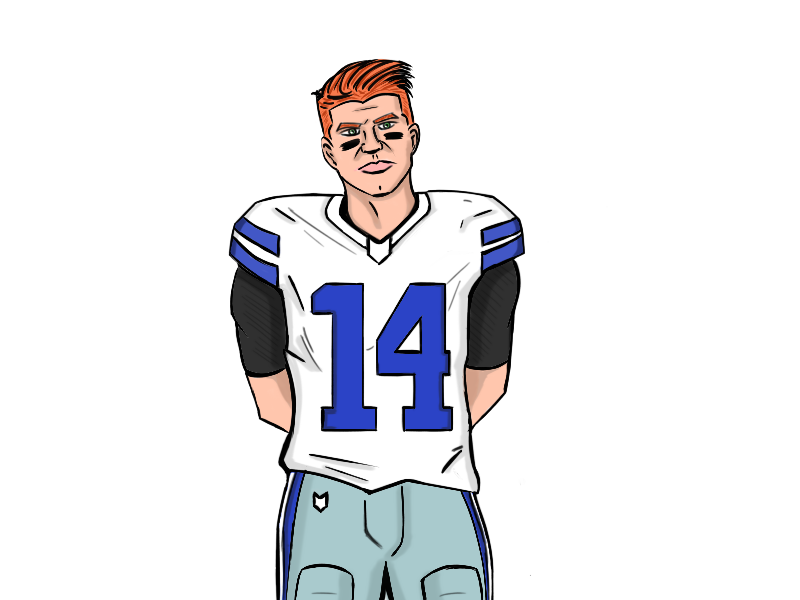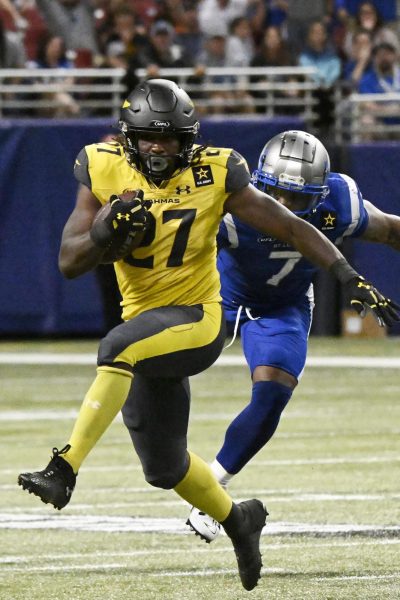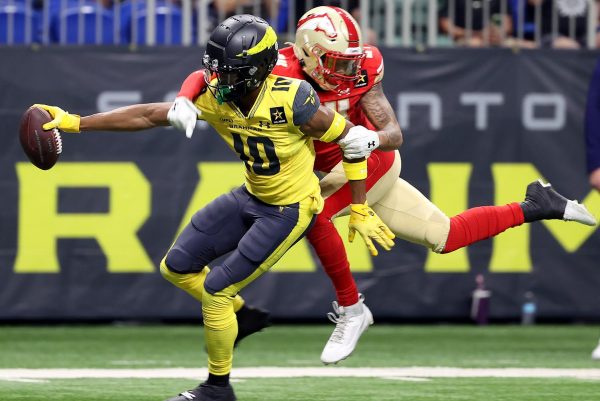Dallas signing Andy Dalton shouldn’t be seen as a threat to Dak Prescott
May 22, 2020
Longtime Cincinnati Bengals starting quarterback Andy Dalton’s first foray into free agency didn’t last very long. After being released by the Bengals after nine years with the team, Dalton was signed by the Dallas Cowboys on a one-year contract worth up to $7 million, of which only $3 million is guaranteed. Many pundits took this as a sign that Dallas could be looking to replace Dallas starting quarterback Dak Prescott, who remains embroiled in tense negotiations with the Cowboys over a contract extension. This would appear to be a rushed judgment, however, as the Dalton signing doesn’t necessarily mean the Cowboys are looking to replace Prescott.
For starters, backup quarterbacks are valuable commodities in the league. As shown last season by the New Orleans Saints and Pittsburgh Steelers, having a quality backup quarterback on the roster may be the make-or-break factor in whether or not a team is able to make the playoffs. Dating back to the Eagles Super Bowl victory in 2018, where backup Nick Foles orchestrated a magical playoff run where he replaced the injured Carson Wentz, there’s a strong argument the Eagles would have been knocked off with an injury of that magnitude. Dalton presents himself as a clear upgrade from the backup quarterback position over former backup Cooper Rush. Considering Prescott is a quarterback who uses his athleticism to escape and move outside the pocket regularly, which exposes him to more hits, having a quality backup insurance policy may be all the Cowboys are hoping to accomplish with this move.
In addition, the notion that Dalton is going to come in and take Prescott’s starting job is just wishful thinking by most disgruntled Cowboys fans. Since entering the league in 2011, Dalton has enjoyed a solid career — one that has never seen him elevate himself into the upper echelons of the quarterback hierarchy. His best year possibly came in 2015 when he appeared in the first 13 games of the Bengals season, throwing for 3,250 yards, 25 touchdowns and seven interceptions and compiling a career-best 106.2 quarterback rating. Unfortunately, Dalton’s season was cut short by a thumb injury on his throwing hand, so he missed the rest of the season. This stands as the only time Dalton’s quarterback rating has broken 95 in his career so far. By contrast, Prescott is coming off a career-best year statistically, throwing for 4,902 yards, 30 touchdowns and 11 interceptions, good enough for a 99.7 quarterback rating. In four seasons, Prescott was able to sustain a passer rating of at least 95+ in three of those seasons. Though Prescott had a good season last year, he struggled to win the big games, coming up short in crucial moments against the Minnesota Vikings, New England Patriots, Buffalo Bills and Philadelphia Eagles with the game on the line. Many have questioned whether or not Prescott is the right quarterback to deliver the Cowboys a Super Bowl due to these struggles. However, if the goal is to win a Super Bowl, Dalton isn’t the quarterback likely to take the Cowboys there. Prior to the Bengals’ implosion over the last several years, their teams during the mid-2010s possessed enormous talent and depth but were unable to get over the hump in the playoffs. Dalton holds a 0-4 record in the playoffs with one touchdown and six interceptions, leading to a 57.8 quarterback rating. Prescott has already managed to win a playoff game in his career, and it makes little sense for the Cowboys to view Dalton as the more likely candidate to deliver a Super Bowl to Dallas than Prescott.
With all of that being said, however, this move appears to be more about taking leverage in the contract extension negotiations from Prescott and returning it to the Cowboys. Prescott is reportedly seeking a contract that would put him inside the top three paid players at his position. Thus far, the Cowboys have been unwilling to meet that number, presumably failing to see Prescott as worthy of that kind of contract. As evidenced by their signing of every other major free agent piece of the offense to contract extensions this offseason and their decision to franchise tag Prescott, the Cowboys view Prescott as a byproduct of their offense rather than the driving engine of it. While it is my belief that Prescott is not worth the contract he is asking for, the NFL is a quarterback-driven league, and the value of contract extensions for quarterbacks has been on a nonstop exponential increase over the past few seasons. Due to this and the lack of a solid backup option to replace him in Dallas, Prescott held firm leverage in the negotiations and would’ve likely received a contract much closer to his asking price than the Cowboys’.
The signing of Dalton presents two distinct changes in the situation in Dallas for Prescott. First off, the presence of Dalton in Dallas likely takes away the opportunity for Prescott to threaten to hold out and refuse to sign his franchise tag for the upcoming season. In choosing to hold out and deprive the Cowboys of their starting quarterback at the beginning of training camp and with no other viable option available to replace him, Prescott would have likely been able to force the Cowboys to come up to his asking price and get a deal done. With the presence of a quality backup quarterback like Dalton on the roster, however, the Cowboys may be much more comfortable calling Prescott’s bluff, much like they did during the Ezekiel Elliot contract negotiations. In addition to this, the signing of Dalton appears to be a signal from the Cowboys to Prescott’s camp that the Cowboys are more than willing to explore other quarterback options on the market. While Dalton is unlikely to replace Prescott due to his play on the field, he does serve a function as an important tool for the Cowboys to put pressure on Prescott to sign the franchise tag and possibly reduce his contract demands to something more in line with the Cowboys’ evaluation of his worth.
In all, Andy Dalton is unlikely to supplant Dak Prescott as the Cowboys’ starting quarterback this season. While Dalton would likely serve as a competent starting quarterback in the Cowboys’ offense, past history would indicate that Prescott would give the Cowboys a better chance at postseason success. What this move really boils down to is leverage. The risk for Prescott has become significantly higher in these contract negotiations than they were with Cooper Rush serving as his backup. If a contract extension is not finalized before the beginning of the season and Prescott decides to hold out, the chance that Dalton is able to excel as the starting quarterback and show that Prescott really is a byproduct of the Cowboys’ offense rather than the reason behind its success is that much higher. The Cowboys have indicated they want Prescott to be their starting quarterback moving forward; all the Andy Dalton signing has done is reinforce their position that Prescott will be their starting quarterback at their asking price.










